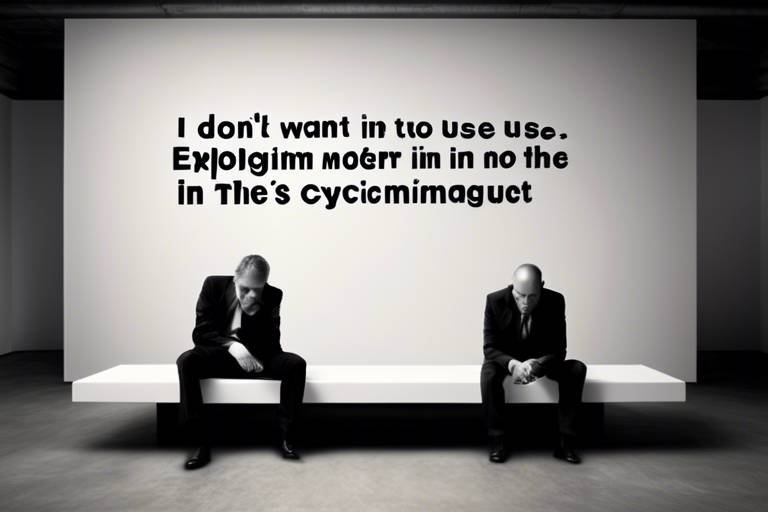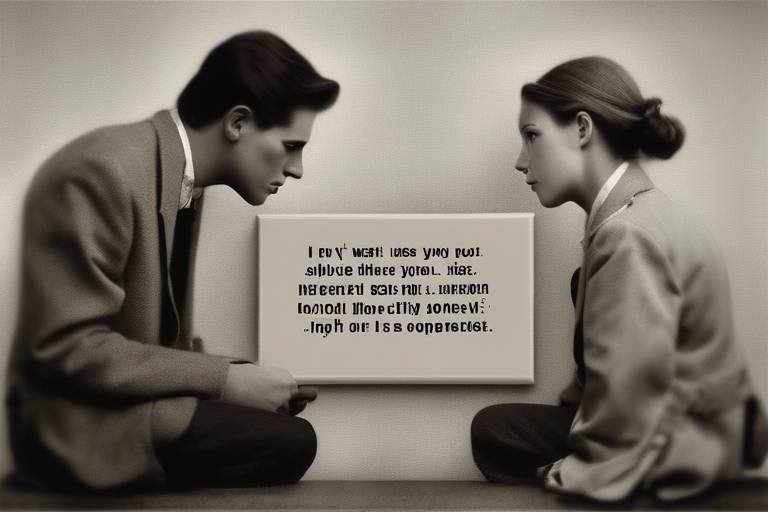Nihilism in the 21st Century - An Exploration
Nihilism, a term that often conjures images of despair and meaninglessness, has taken on new dimensions in the 21st century. In a world characterized by rapid technological advancements, social upheaval, and existential crises, the relevance of nihilistic thought is more pronounced than ever. But what exactly does it mean to embrace nihilism today? Is it merely a rejection of values, or does it serve a deeper purpose in understanding our place in the universe? This article delves into the concept of nihilism as it manifests in contemporary society, examining its implications, influences, and the philosophical debates surrounding it in our modern world.
To grasp the essence of nihilism today, we must first explore its historical and philosophical origins. Nihilism, as a formal concept, emerged in the 19th century, primarily through the works of thinkers like Friedrich Nietzsche and Ivan Turgenev. Nietzsche famously declared that "God is dead," a provocative statement reflecting the decline of traditional moral values in the wake of modernity. This shift laid the groundwork for nihilistic thought, which posits that life lacks inherent meaning or purpose.
Key movements such as existentialism and absurdism also played a crucial role in shaping nihilistic perspectives. Existentialists like Jean-Paul Sartre argued that individuals must create their own meaning in a world devoid of preordained purpose. Meanwhile, absurdists like Albert Camus explored the conflict between human desire for significance and the indifferent universe. These philosophical debates have laid the foundation for contemporary nihilism, influencing how we perceive our existence in an increasingly complex world.
In the 21st century, nihilism has seeped into various aspects of modern culture, impacting everything from art and literature to social movements. As we navigate a landscape filled with uncertainty—be it political turmoil, climate change, or technological disruptions—nihilistic perspectives resonate deeply with our existential concerns. The feeling of disillusionment is palpable, and many find themselves questioning the very foundations of their beliefs and values.
One could argue that nihilism serves as a response to the overwhelming nature of contemporary life. In a society bombarded with information and competing ideologies, the search for meaning can feel futile. Yet, this sense of meaninglessness also opens up new avenues for creativity and expression, prompting artists and writers to explore the depths of human experience in ways that challenge traditional narratives.
Literature has long been a medium through which nihilistic themes are explored. Modern authors grapple with feelings of despair and the quest for meaning, often crafting characters that embody these struggles. Notable works such as "The Stranger" by Albert Camus and "Notes from Underground" by Fyodor Dostoevsky delve into the psyche of individuals confronting the void. These narratives reflect a broader cultural zeitgeist, where the search for purpose becomes a central theme.
Fictional narratives often serve as mirrors to our existential dilemmas. Characters in contemporary novels frequently find themselves at a crossroads, forced to confront their beliefs and the absurdity of their existence. For instance, in "The Road" by Cormac McCarthy, the journey of a father and son through a post-apocalyptic landscape raises profound questions about survival and meaning in a world stripped of morality. These stories resonate with readers, prompting them to reflect on their own lives and the inherent uncertainties we face.
Poetry, as a form of artistic expression, captures the essence of nihilistic sentiments beautifully. Modern poets articulate feelings of disillusionment, often using vivid imagery to convey the struggle for meaning. Works by poets like Sylvia Plath and Charles Bukowski delve into the depths of despair, illustrating the human condition's fragility. Through their verses, they invite readers to grapple with the complexities of existence and the search for significance, even in the face of overwhelming odds.
Artistic expressions, too, reflect the anxieties of our time. Contemporary artists often incorporate nihilistic themes into their work, challenging viewers' perceptions of reality. Movements such as Dadaism and Surrealism emerged as reactions to the chaos of the early 20th century, questioning established norms and embracing absurdity. Today, artists continue to explore these themes, using their platforms to provoke thought and inspire dialogue about the nature of existence.
The implications of nihilism extend beyond cultural expressions; they profoundly affect individual psychology. In a fast-paced society where the pressure to succeed is relentless, embracing nihilistic beliefs can lead to feelings of isolation and despair. The question arises: how does one navigate a world perceived as devoid of inherent purpose? Understanding the psychological consequences of nihilism is crucial in addressing the mental health challenges many face today.
The relationship between nihilism and anxiety is intricate. The pervasive sense of meaninglessness can exacerbate mental health issues, leading individuals to experience existential anxiety. This anxiety often manifests as a fear of the unknown, prompting questions about one's place in the universe. It's essential to recognize that while nihilism may contribute to these feelings, it can also serve as a catalyst for personal growth and self-discovery.
Despite the bleak outlook that nihilism may present, many individuals seek to create personal meaning. Philosophies such as existentialism encourage the idea that we have the power to shape our own destinies, even in a seemingly indifferent universe. Practices like mindfulness and meditation also provide tools for navigating a nihilistic worldview, allowing individuals to find peace in the present moment and cultivate a sense of purpose.
- What is nihilism? Nihilism is a philosophical belief that life lacks inherent meaning, value, or purpose.
- How does nihilism affect mental health? Nihilism can lead to feelings of despair and anxiety, as individuals grapple with the absence of meaning in their lives.
- Can nihilism be positive? While nihilism often has negative connotations, it can also encourage personal growth and the creation of individual meaning.
- How is nihilism represented in art and literature? Nihilism is depicted in various forms of art and literature, often exploring themes of despair, absurdity, and the search for meaning.

The Roots of Nihilism
Nihilism, at its core, is a philosophical doctrine that asserts the absence of meaning or value in life. To truly understand nihilism, we must journey through its historical and philosophical origins, tracing back to the tumultuous landscapes of Europe in the 19th century. Thinkers like Friedrich Nietzsche and Søren Kierkegaard played pivotal roles in shaping nihilistic thought, each contributing unique perspectives that resonate even today. Nietzsche, for instance, famously declared that "God is dead," which encapsulated the crisis of meaning that arose from the decline of traditional religious beliefs. This sentiment echoed the disillusionment of a society grappling with rapid industrialization and the loss of established moral frameworks.
Moreover, nihilism can be seen as a reaction to the Enlightenment's emphasis on reason and rationality. As people began to question the certainties of faith and tradition, a void emerged, leading to a profound sense of existential despair. This shift is not merely a historical footnote; it lays the groundwork for understanding the modern nihilistic mindset. The existentialists, who followed in the footsteps of earlier nihilistic thinkers, explored the implications of living in a world devoid of inherent meaning. They argued that individuals must confront the absurdity of existence and create their own values. This idea resonates strongly in today's society, where many feel lost in the chaos of modern life.
To further comprehend nihilism's roots, we can categorize its evolution into key movements and thinkers that have influenced its trajectory:
- Friedrich Nietzsche: Often regarded as the father of nihilism, Nietzsche's critiques of morality and religion laid the groundwork for existential thought.
- Søren Kierkegaard: Although he is often seen as a precursor to existentialism, Kierkegaard's exploration of despair and anxiety contributed to nihilistic discussions.
- Existentialism: This movement, which includes figures like Jean-Paul Sartre and Albert Camus, delves into the absurdity of life and the quest for personal meaning.
In essence, the roots of nihilism are deeply intertwined with the historical context of the 19th and 20th centuries. The philosophical debates that emerged during this time continue to influence contemporary thought, as individuals grapple with questions of existence, purpose, and the nature of reality. Understanding these roots not only enriches our comprehension of nihilism but also highlights its relevance in today's fast-paced, often chaotic world. As we navigate through modern society, the echoes of these philosophical discussions remind us that the search for meaning is as vital now as it was then.

Nihilism and Modern Society
Nihilism, a term that often evokes a sense of dread, has seeped into the very fabric of modern society, influencing everything from our daily interactions to our cultural outputs. In a world inundated with information, where traditional values and beliefs are constantly questioned, the nihilistic perspective resonates more than ever. Have you ever felt that everything you’ve been taught about purpose and meaning is just a façade? This sentiment is not uncommon and reflects a broader cultural phenomenon.
As we navigate through the complexities of the 21st century, it’s crucial to understand how nihilism shapes our thoughts and actions. The rise of technology and social media has created an environment where individuals often feel disconnected and disillusioned. The constant barrage of curated lives on social media can lead to feelings of inadequacy, prompting many to question the significance of their own existence. This existential crisis can be viewed through the lens of nihilism, which argues that life lacks inherent meaning. But is this a cause for despair, or can it be a catalyst for personal growth?
One of the most striking manifestations of nihilism in modern society is its influence on art and literature. Artists and writers often grapple with themes of meaninglessness, reflecting the anxieties of a generation that feels lost in a chaotic world. For instance, contemporary novels frequently feature protagonists who struggle with existential dilemmas, embodying the very essence of nihilistic thought. These narratives resonate with readers who find themselves questioning their own purpose, creating a shared experience of existential reflection.
Moreover, nihilism has found its way into various social movements. Many activists and thinkers express a sense of disillusionment with established systems, advocating for radical changes that challenge the status quo. This can be seen in movements that reject traditional norms and values, pushing for a reevaluation of what it means to live a meaningful life. The irony here is palpable: while nihilism suggests a rejection of meaning, it simultaneously fuels a quest for new forms of significance and community.
To illustrate this impact, consider the following table that outlines key areas where nihilism influences modern culture:
| Area | Influence of Nihilism |
|---|---|
| Art | Exploration of despair and existential angst through various mediums |
| Literature | Characters grappling with meaninglessness, reflecting societal anxieties |
| Social Movements | Rejection of traditional values, advocating for radical change |
| Media | Portrayal of existential crises in films and television shows |
In addition to these cultural reflections, nihilism also permeates our daily lives. The overwhelming nature of modern existence can lead to a sense of apathy, where individuals struggle to find motivation or purpose. This is particularly evident among younger generations, who often feel pressured to succeed in a world that seems to offer little in the way of guarantees. The rise of mental health awareness has brought these issues to the forefront, prompting discussions about the implications of nihilistic beliefs on our psychological well-being.
So, how do we navigate a world that often feels devoid of meaning? While nihilism can seem bleak, it also opens the door to personal exploration and the creation of individual meaning. Many find solace in philosophies that encourage self-discovery and the crafting of personal narratives. By embracing the idea that meaning is not preordained but rather something we create for ourselves, individuals can reclaim a sense of agency in their lives.
In conclusion, nihilism is not merely a philosophical stance; it is a lens through which we can examine the complexities of modern society. As we grapple with questions of purpose and existence, understanding nihilism's influence can lead to deeper insights into our own lives and the world around us. Are we simply products of a chaotic universe, or can we forge our own paths amid the uncertainty? The choice, ultimately, lies in our hands.

Nihilism in Literature
Nihilism in literature serves as a profound reflection of the human condition, often portraying a world stripped of meaning and purpose. This literary movement, which gained momentum in the late 19th and early 20th centuries, resonates deeply with readers who grapple with existential questions. Authors have utilized nihilistic themes to explore the complexities of life, love, and loss, inviting readers to confront the void that often lurks beneath the surface of existence. The beauty of literature lies in its ability to articulate feelings that many experience but few can express, and nihilism provides a lens through which these sentiments can be examined.
Notable works that embody nihilistic ideas often feature characters who find themselves ensnared in a web of absurdity, struggling against the futility of their efforts. For instance, Fyodor Dostoevsky's Notes from Underground presents a protagonist who is painfully aware of the meaninglessness of his existence, leading to a profound sense of isolation and despair. Similarly, Franz Kafka's The Metamorphosis showcases an individual transformed into a grotesque creature, highlighting the absurdity of life and the alienation that accompanies it. These narratives do not merely paint a bleak picture; they challenge readers to reflect on their own lives and the societal structures that shape their realities.
Moreover, the nihilistic themes in literature are not confined to a specific genre. They permeate various forms of storytelling, from novels to poetry, each medium offering a unique perspective on the human experience. For instance, the poetry of T.S. Eliot, particularly in The Waste Land, encapsulates feelings of disillusionment and fragmentation in a post-war world, echoing the sentiments of a society grappling with its own identity. Eliot’s work serves as a testament to how nihilism can manifest in the artistic expression of despair and the search for meaning amidst chaos.
As we delve deeper into contemporary literature, we encounter a new wave of authors who tackle nihilistic themes in innovative ways. Writers like Chuck Palahniuk and Bret Easton Ellis explore the emptiness of consumer culture and the superficiality of modern life, often employing dark humor and satire to critique societal norms. Their works, such as Fight Club and American Psycho, exemplify how nihilism can serve as both a critique of and a response to the prevailing cultural landscape. These narratives resonate with readers who find themselves questioning the values imposed by society and seeking authenticity in a world that often feels devoid of it.
In summary, nihilism in literature acts as a mirror reflecting the anxieties and existential dilemmas of contemporary life. Through various narratives and poetic expressions, authors invite us to confront the uncomfortable truths about our existence. By engaging with these themes, readers can find solace in shared experiences of disillusionment and the quest for meaning. As we continue to explore the literary landscape, it becomes evident that nihilism remains a powerful force, shaping the voices of writers and the hearts of readers alike.
- What is nihilism in literature?
Nihilism in literature refers to the exploration of themes related to meaninglessness, despair, and the absurdity of life. It often portrays characters who struggle with their existence and question societal values. - Which authors are known for their nihilistic themes?
Notable authors include Fyodor Dostoevsky, Franz Kafka, T.S. Eliot, Chuck Palahniuk, and Bret Easton Ellis, among others. - How does nihilism impact readers?
Nihilism can provoke deep reflection and emotional responses, allowing readers to confront their own existential questions and feelings of disillusionment.

Existential Themes in Fiction
In the realm of literature, existential themes have emerged as a powerful lens through which authors explore the complexities of human existence. These themes often delve into the abyss of meaninglessness, presenting characters who grapple with their place in a seemingly indifferent universe. Much like a ship lost at sea, these literary figures navigate turbulent waters of despair and uncertainty, seeking a sense of purpose amid chaos. The existentialist narrative often raises profound questions: What is the meaning of life? Is there any inherent value in our existence? Such inquiries resonate deeply with readers, inviting them to reflect on their own lives and beliefs.
One notable example of existential themes in fiction can be found in the works of **Franz Kafka**. His novella, *The Metamorphosis*, portrays the transformation of Gregor Samsa into a grotesque insect, symbolizing the alienation and absurdity of modern life. This metamorphosis serves as a stark reminder of how easily one can become estranged from their own identity and humanity. Kafka's exploration of existential dread captures the essence of feeling trapped in a world that offers no clear answers or solace.
Another significant contribution to existential literature comes from **Albert Camus**, particularly in his novel *The Stranger*. The protagonist, Meursault, embodies the absurdist perspective, living a life devoid of conventional meaning. His detachment from societal norms and emotional apathy challenges readers to confront the uncomfortable truth of existence: life is inherently absurd, and seeking meaning may be a futile endeavor. Camus masterfully illustrates this through Meursault's indifference to his mother's death and his eventual confrontation with the absurdity of his own mortality.
Moreover, contemporary authors continue to explore existential themes, often reflecting the anxieties of modern society. For instance, **David Foster Wallace** in *Infinite Jest* tackles the pervasive sense of disconnection and the search for authenticity in a world saturated with distractions. His characters wrestle with addiction, depression, and the relentless pursuit of pleasure, highlighting the struggle to find genuine meaning in an age of superficiality. This narrative mirrors the existential crisis many face today, where the quest for fulfillment often leads to more questions than answers.
The beauty of existential themes in fiction lies in their ability to resonate with diverse audiences. Readers can find solace in the shared experience of grappling with life's uncertainties, feeling less alone in their struggles. The following table summarizes some key existential works and their themes:
| Author | Work | Themes |
|---|---|---|
| Franz Kafka | The Metamorphosis | Alienation, Absurdity |
| Albert Camus | The Stranger | Absurdism, Indifference |
| David Foster Wallace | Infinite Jest | Disconnection, Search for Meaning |
Ultimately, existential themes in fiction serve as a mirror reflecting our deepest fears and desires. They challenge us to confront the void and inspire us to carve out our own meaning in a world that often feels chaotic and unpredictable. As readers immerse themselves in these narratives, they may find not only a sense of understanding but also a glimmer of hope amidst the darkness. After all, the journey to discover meaning might just be the most profound adventure of all.

Poetry and Nihilism
Poetry has long served as a powerful medium for expressing the profound complexities of human emotion and thought, making it an ideal canvas for exploring the themes of nihilism. In a world where traditional values and beliefs are increasingly questioned, poets often find themselves grappling with a sense of disillusionment and the search for meaning in the void. The stark realities of existence, the fleeting nature of life, and the absence of inherent purpose are prevalent motifs that resonate deeply within modern poetry.
Many contemporary poets articulate their nihilistic sentiments through vivid imagery and poignant language, capturing the essence of a world that feels devoid of meaning. For instance, consider how poets like Charles Bukowski and Sylvia Plath navigate the turbulent waters of despair and existential angst. Their works often reflect a struggle against the weight of existence, portraying characters who confront the absurdity of life. Through their verses, they invite readers to ponder the implications of a reality where meaning is not given but must be forged from the chaos.
One notable aspect of nihilistic poetry is its ability to encapsulate the tension between despair and hope. While the themes may seem overwhelmingly bleak, many poets suggest that the act of creating art itself can be a form of resistance against nihilism. In this light, poetry becomes a means to reclaim agency and assert one's existence, even in the face of a seemingly indifferent universe. This duality can be seen in the works of poets such as Rainer Maria Rilke, who, despite grappling with existential questions, ultimately offers a glimmer of hope through the act of creation.
Furthermore, the structure of poetry allows for a unique exploration of nihilistic themes. The use of form and structure can mirror the chaos of life, with free verse often reflecting the unpredictability of human experience. In contrast, traditional forms may serve to highlight the tension between the desire for order and the recognition of life's inherent disorder. This interplay can lead to a rich tapestry of meaning, where the absence of definitive answers invites readers to engage more deeply with the text.
Ultimately, poetry's relationship with nihilism is a complex dance between despair and the search for meaning. It challenges readers to confront uncomfortable truths while simultaneously offering a space for reflection and introspection. As poets continue to explore these themes, their works serve as a reminder that even in the face of meaninglessness, the act of creation can be a powerful defiance against the void.
- What is nihilism in poetry? Nihilism in poetry refers to the exploration of themes related to meaninglessness, despair, and existential angst. Poets often use this lens to reflect on the human condition and the search for purpose.
- Who are some notable nihilistic poets? Some notable poets who explore nihilistic themes include Charles Bukowski, Sylvia Plath, Rainer Maria Rilke, and T.S. Eliot.
- How does nihilism influence modern poetry? Nihilism influences modern poetry by encouraging poets to grapple with existential questions, often leading to a blend of despair and a search for personal meaning through the act of creation.

Nihilism in Art
Art has always been a mirror reflecting the society from which it emerges, capturing the essence of human experience in various forms. In the 21st century, nihilism has seeped into artistic expressions, challenging traditional notions of beauty, purpose, and meaning. Contemporary artists are increasingly drawn to themes of disillusionment and absurdity, creating works that provoke thought and invite viewers to confront their own perceptions of reality. This exploration of nihilism in art is not merely a trend but a profound response to the existential crises faced by individuals in a rapidly changing world.
One of the most striking aspects of nihilistic art is its ability to resonate with feelings of emptiness and disconnection. Artists often utilize stark imagery, chaotic compositions, and unconventional materials to convey a sense of chaos and meaninglessness. For instance, the rise of movements like Dadaism and Surrealism in the early 20th century laid the groundwork for contemporary nihilistic art, with their rejection of conventional aesthetics and exploration of the absurd. Today, we see these influences manifest in various forms, from graffiti to digital art, each challenging the viewer's understanding of reality and purpose.
Consider the works of modern artists such as Banksy and Damien Hirst. Banksy’s street art often critiques societal norms and consumer culture, highlighting the futility of modern existence. His pieces, laden with irony and dark humor, serve as a commentary on the absurdity of contemporary life. Hirst, on the other hand, confronts mortality and the commodification of art through his provocative installations, such as the infamous The Physical Impossibility of Death in the Mind of Someone Living, which features a preserved shark in formaldehyde. Both artists embody the nihilistic ethos by questioning the very foundations of art and existence.
Moreover, nihilism in art also extends to performance and installation art, where the act of creation becomes a commentary on the void of meaning. Performance artists like Marina Abramović push boundaries, engaging audiences in immersive experiences that evoke feelings of vulnerability and existential reflection. For example, her piece The Artist is Present invites viewers to sit silently across from her, creating a space where the absence of words speaks volumes about connection and isolation in a nihilistic world.
In addition to visual and performance art, nihilism has also influenced the realm of digital art. As technology evolves, artists are exploring new mediums that challenge traditional forms. The use of algorithms, virtual reality, and artificial intelligence raises questions about authorship, authenticity, and the very nature of art itself. This digital revolution not only reflects a nihilistic perspective but also invites audiences to reconsider their relationship with art in a world increasingly dominated by technology.
Ultimately, nihilism in art serves as a powerful vehicle for exploring the complexities of human existence. It confronts us with uncomfortable truths and invites us to question our beliefs and values. While some may view nihilistic art as bleak or pessimistic, it can also be seen as a catalyst for personal reflection and societal change. By engaging with these themes, artists encourage us to grapple with the void and, perhaps, find our own meaning amidst the chaos.
- What is nihilism in art? Nihilism in art refers to artistic expressions that reflect themes of meaninglessness, absurdity, and disillusionment, challenging traditional notions of beauty and purpose.
- How does contemporary art reflect nihilistic themes? Contemporary art often uses stark imagery and unconventional materials to convey feelings of chaos and emptiness, resonating with the existential crises of modern society.
- Who are some notable nihilistic artists? Artists like Banksy and Damien Hirst are known for their works that embody nihilistic themes, questioning societal norms and the nature of existence.

The Psychological Impact of Nihilism
Nihilism isn't just a philosophical stance; it has real, tangible effects on our mental health and overall worldview. Imagine waking up every day feeling as though nothing truly matters. This feeling can spiral into a deep sense of despair, leading individuals to question their existence and the purpose of life itself. In a world that often feels chaotic and unpredictable, nihilism can exacerbate feelings of anxiety and depression, making it crucial to understand its psychological impact.
One of the most significant psychological consequences of nihilism is the emergence of existential anxiety. This type of anxiety arises when individuals grapple with the idea that life lacks inherent meaning. It can feel like standing on the edge of a vast abyss, where every decision seems trivial and every goal feels pointless. This sense of void can lead to a cycle of negative thoughts, where individuals find themselves trapped in a loop of questioning their significance and the value of their actions.
Moreover, nihilism can create a disconnect from societal norms and values. When one adopts a nihilistic viewpoint, they may start to feel alienated from the very fabric of society. This alienation can lead to feelings of loneliness and isolation, as it becomes challenging to relate to others who still hold onto traditional beliefs and values. It's as if they are watching a play from the sidelines, unable to engage with the characters on stage. The struggle to relate can further deepen their psychological distress, leading to a sense of being lost in a world that feels indifferent.
However, it's essential to recognize that not all individuals respond to nihilism in the same way. Some may find a strange sense of liberation in the absence of inherent meaning. For them, the lack of predetermined purpose can open doors to self-exploration and creativity. They might embrace the freedom to craft their own meaning, using their experiences and passions as a canvas to paint a fulfilling life. It's a paradox: while nihilism can lead to despair for some, it can also inspire others to seek personal significance in a seemingly indifferent universe.
To further illustrate the psychological impact of nihilism, consider the following table that outlines common mental health effects associated with nihilistic beliefs:
| Mental Health Effect | Description |
|---|---|
| Existential Anxiety | A feeling of unease stemming from the belief that life lacks inherent meaning. |
| Depression | A pervasive sense of hopelessness and despair, often linked to nihilistic views. |
| Isolation | Feelings of disconnection from society and others due to differing beliefs. |
| Creative Freedom | Some individuals may embrace nihilism as a way to explore personal creativity and self-expression. |
Despite these challenges, many individuals seek ways to combat the negative aspects of nihilism. Practices such as mindfulness, therapy, and community engagement can provide avenues for finding meaning and connection in life. By focusing on personal values and relationships, individuals can create a sense of purpose that counters the bleakness often associated with nihilistic thought. It's a journey of transformation, where one learns to navigate the complexities of existence, even when faced with the void.
In conclusion, the psychological impact of nihilism is profound and multifaceted. While it can lead to anxiety and despair for some, it can also serve as a catalyst for personal growth and self-discovery for others. Understanding these dynamics is essential in helping individuals cope with the challenges posed by nihilistic beliefs, ultimately guiding them toward a more meaningful existence.
- What is nihilism? Nihilism is a philosophical viewpoint that suggests life lacks inherent meaning, purpose, or value.
- How does nihilism affect mental health? Nihilism can lead to feelings of existential anxiety, depression, and isolation, but it may also inspire creativity and personal exploration for some.
- Can nihilism be positive? Yes, while nihilism often has negative connotations, it can also provide individuals with the freedom to create their own meaning and purpose.
- What can I do if I feel nihilistic? Seeking therapy, engaging in mindfulness practices, and connecting with supportive communities can help combat feelings of nihilism.

Nihilism and Anxiety
Nihilism, with its profound sense of meaninglessness, can create a complex relationship with anxiety that many individuals grapple with today. Imagine standing on the edge of a vast, empty abyss, where every belief, every value, and every purpose you once held dear has crumbled into dust. This feeling can be overwhelming, leading to a spiral of existential dread. As people confront the void, they often experience a surge of anxiety that stems from the uncertainty of existence itself. The question arises: if nothing matters, then what is the point of anything? This paradox can create a mental tug-of-war, where the mind oscillates between seeking meaning and succumbing to despair.
Importantly, nihilism does not merely exist in a vacuum; it interacts with the fast-paced, often chaotic nature of modern society. With the constant barrage of information and the pressure to find one's place in a rapidly changing world, many individuals find themselves questioning the very fabric of their beliefs. The anxiety that arises from this questioning can manifest in various ways, including:
- Existential Anxiety: A deep-seated fear of life's inherent meaninglessness.
- Social Anxiety: Concern over how one's nihilistic beliefs may be perceived by others.
- Generalized Anxiety: A pervasive sense of worry that can stem from an inability to find purpose.
This anxiety can lead to a cycle where the more one grapples with nihilistic thoughts, the more entrenched the feelings of anxiety become. For many, the realization that life may lack inherent meaning can feel like a heavy burden. It’s as if one is carrying an invisible backpack filled with rocks, each representing a doubt or fear. The weight can become unbearable, leading to mental health challenges that require attention and care.
However, it’s crucial to recognize that while nihilism can exacerbate feelings of anxiety, it can also serve as a catalyst for personal growth. By confronting the void and acknowledging the absence of predetermined meaning, individuals are often pushed to create their own sense of purpose. This transformative journey can lead to a more authentic existence, where one actively seeks out what brings joy and fulfillment, despite the lack of inherent meaning in life.
In navigating these turbulent waters, many turn to various philosophies and practices to help find balance. Techniques such as mindfulness, meditation, and even engaging in creative pursuits can provide solace. By focusing on the present moment or channeling feelings into art or writing, individuals can reclaim agency over their lives, transforming anxiety into a powerful motivator for self-discovery.
Ultimately, the relationship between nihilism and anxiety is intricate and multifaceted. While nihilism can amplify feelings of unease and despair, it also opens the door to the possibility of crafting one's own meaning in a seemingly indifferent universe. It’s a journey fraught with challenges, but also rich with opportunities for personal growth and understanding.
- What is nihilism? Nihilism is a philosophical belief that life lacks inherent meaning, purpose, or value.
- How does nihilism relate to anxiety? Nihilism can lead to feelings of existential dread and anxiety as individuals grapple with the implications of a meaninglessness existence.
- Can nihilism be beneficial? While it can contribute to anxiety, nihilism can also encourage individuals to create their own meaning and purpose in life.
- What are some strategies to cope with nihilistic anxiety? Techniques like mindfulness, meditation, and creative expression can help individuals manage feelings of anxiety associated with nihilism.

Finding Meaning in a Nihilistic World
In a world that often feels devoid of inherent purpose, the quest for meaning becomes a profound challenge. Nihilism, with its assertion that life lacks intrinsic value, can leave many feeling lost and disheartened. However, amidst this existential void, there lies a glimmer of hope—an opportunity to forge our own paths and create personal significance. The journey to find meaning in a nihilistic world is not only possible but can also be incredibly fulfilling.
One of the most empowering aspects of confronting nihilism is the realization that we are the architects of our own lives. Just as an artist starts with a blank canvas, we can shape our existence through our choices, passions, and relationships. This process often involves embracing a few key philosophies:
- Existentialism: This philosophy encourages individuals to confront the absurdity of life and to create their own meaning through authentic experiences.
- Humanism: Focusing on human values and the importance of empathy, this approach promotes the idea that we can find purpose in our connections with others.
- Mindfulness: Practicing mindfulness allows us to appreciate the present moment, helping to cultivate a sense of peace and purpose even in the face of uncertainty.
Additionally, engaging in creative pursuits can serve as a powerful antidote to nihilistic despair. Whether through writing, painting, or music, expressing oneself artistically can help to channel feelings of emptiness into something tangible and beautiful. This act of creation not only fosters personal meaning but also connects us to others who share similar struggles.
Moreover, many individuals find solace in community and shared experiences. By participating in social movements, volunteering, or simply spending time with loved ones, we can cultivate a sense of belonging that counters the isolation often associated with nihilism. These connections remind us that while life may lack inherent meaning, the relationships we build can provide a rich tapestry of significance.
Ultimately, the journey of finding meaning in a nihilistic world is deeply personal and subjective. Each person's path may look different, and that's perfectly okay. It’s about discovering what resonates with you, what ignites your passions, and what fills your life with joy. So, in a universe that may seem indifferent, dare to seek out your own purpose. Embrace the uncertainty, and remember that even in the void, there’s potential for beauty and meaning to flourish.
1. Can nihilism be a positive influence on my life?
Yes, while nihilism can initially seem bleak, it can also empower you to create your own meaning and values. By recognizing that life lacks inherent purpose, you can take control and shape your own destiny.
2. How can I cope with feelings of meaninglessness?
Engaging in activities that bring you joy, such as creative pursuits or community involvement, can help combat feelings of emptiness. Additionally, exploring philosophies like existentialism or humanism may provide valuable insights.
3. Is it possible to find meaning in relationships?
Absolutely! Building connections with others can provide a profound sense of purpose. Relationships often serve as a source of support and fulfillment, reminding us that we are not alone in our struggles.
4. What role does mindfulness play in finding meaning?
Mindfulness encourages you to live in the present moment, helping you appreciate life's experiences as they come. This practice can foster a sense of peace and clarity, making it easier to find meaning amidst uncertainty.
Frequently Asked Questions
- What is nihilism?
Nihilism is a philosophical belief that suggests life lacks inherent meaning, purpose, or value. It challenges traditional beliefs and often leads to a sense of existential despair. In the 21st century, nihilism has found new expressions in various cultural and artistic movements, reflecting contemporary anxieties and disillusionments.
- How does nihilism affect modern society?
Nihilism influences modern society in numerous ways, particularly through art, literature, and social movements. It resonates with current existential concerns, often highlighting feelings of meaninglessness in a rapidly changing world. Many artists and writers use nihilistic themes to explore the human condition, prompting audiences to confront uncomfortable truths about existence.
- Can nihilism lead to mental health issues?
Yes, embracing nihilistic beliefs can contribute to mental health challenges, particularly anxiety and depression. The pervasive sense of meaninglessness can exacerbate feelings of isolation and despair. However, understanding these feelings can also be a first step toward finding personal meaning and purpose in life.
- Are there any positive aspects of nihilism?
While nihilism is often viewed negatively, it can also lead to personal liberation. By rejecting imposed meanings and societal norms, individuals may find the freedom to create their own values and purposes. This perspective can empower people to live authentically and pursue what truly matters to them.
- How can one find meaning in a nihilistic worldview?
Finding meaning in a nihilistic worldview often involves exploring various philosophies and practices. Many people turn to existentialism, humanism, or spirituality to create their own sense of purpose. Engaging in meaningful relationships, pursuing passions, and contributing to the community can also provide a sense of fulfillment in an otherwise indifferent universe.
- What are some notable works that explore nihilism?
Several contemporary authors and poets delve into nihilistic themes in their works. Notable examples include novels like "The Stranger" by Albert Camus and "Fight Club" by Chuck Palahniuk, as well as poetry by writers like Charles Bukowski and Sylvia Plath. These works often reflect characters grappling with existential dilemmas and the search for meaning in a chaotic world.



















